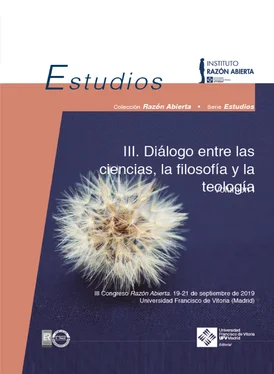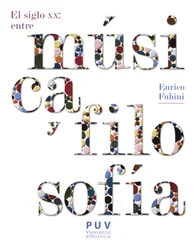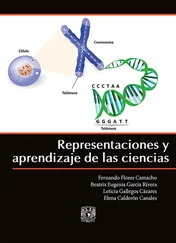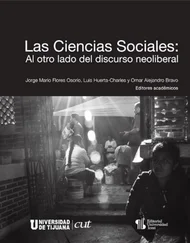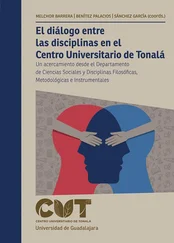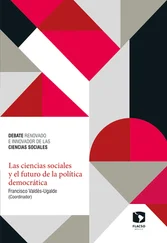María Lacalle - III Diálogo entre las ciencias, la filosofía y la teología. Volumen I
Здесь есть возможность читать онлайн «María Lacalle - III Diálogo entre las ciencias, la filosofía y la teología. Volumen I» — ознакомительный отрывок электронной книги совершенно бесплатно, а после прочтения отрывка купить полную версию. В некоторых случаях можно слушать аудио, скачать через торрент в формате fb2 и присутствует краткое содержание. Жанр: unrecognised, на испанском языке. Описание произведения, (предисловие) а так же отзывы посетителей доступны на портале библиотеки ЛибКат.
- Название:III Diálogo entre las ciencias, la filosofía y la teología. Volumen I
- Автор:
- Жанр:
- Год:неизвестен
- ISBN:нет данных
- Рейтинг книги:5 / 5. Голосов: 1
-
Избранное:Добавить в избранное
- Отзывы:
-
Ваша оценка:
- 100
- 1
- 2
- 3
- 4
- 5
III Diálogo entre las ciencias, la filosofía y la teología. Volumen I: краткое содержание, описание и аннотация
Предлагаем к чтению аннотацию, описание, краткое содержание или предисловие (зависит от того, что написал сам автор книги «III Diálogo entre las ciencias, la filosofía y la teología. Volumen I»). Если вы не нашли необходимую информацию о книге — напишите в комментариях, мы постараемся отыскать её.
III Diálogo entre las ciencias, la filosofía y la teología. Volumen I — читать онлайн ознакомительный отрывок
Ниже представлен текст книги, разбитый по страницам. Система сохранения места последней прочитанной страницы, позволяет с удобством читать онлайн бесплатно книгу «III Diálogo entre las ciencias, la filosofía y la teología. Volumen I», без необходимости каждый раз заново искать на чём Вы остановились. Поставьте закладку, и сможете в любой момент перейти на страницу, на которой закончили чтение.
Интервал:
Закладка:
There are plenty of physicists who understand this, and realize that their discipline can study only physical processes and natural laws, not how or why there are any physical processes or natural laws whatsoever. But metaphysical naturalists who believe in physics as first philosophy are oblivious of this distinction. Some think, for example, that if we can explain everything back to the instant of the Big Bang itself, to the most basic, primordial conditions that were followed by the expansion of the universe with such incomprehensible power and accelerating velocity, we would have explained the mystery of existence. An entirely physical, naturalist cosmology would be tantamount to a comprehensive ontology. But this is fundamentally confused, and ultimately irrational: it fails to recognize that whatever were the most elementary conditions and character of natural reality at the moment of the Big Bang, they are ontologically no less contingent – no more capable of explaining the fact of their existence – than is our universe in its ever-expanding, highly differentiated form 13.7 billion years later. To see this is to realize the rational inference that follows: something ontologically beyond or outside the entire natural order that is not contingent must exist, something which can and does both in principle and in fact account for the existence of the natural order – even though how this is so remains not merely obscure, but vertiginously incomprehensible. On the other hand, to insist that there must be something ontologically contingent that is «just there,» that «the natural order» or «natural laws» or «nature as such» or «the basic physical constituent realities of the universe» are somehow simply a given and whose existence need not be explained, is nothing less than the abdication of reason at the analytical endpoint of precisely the rational process that seeks to understand the totality of human experience, human history, the natural history of our world, and the history of the universe, by showing the interconnected, integral character of different sorts of knowledge gained through all the academic disciplines. It is irrationally to draw back from the precipice of reason to which reason itself leads. Positing any brute facticity of existence to the universe, nature, natural laws, matter-energy, or the like amounts to physics refusing to yield to philosophy not simply when it «should,» but must , and this according to its own principles – provided those principles are well understood. A failure to do so indicates a failure to understand what science itself can and cannot do, what the natural sciences are in contrast to what they cannot be ; it is symptomatic of the unwarranted metastasis of naturalism into a metaphysical assertion. The crucial distinction in question can be helpfully brought out by comparing the relevant arguments from two books published in the last decade: A Universe from Nothing: Why There Is Something Rather Than Nothing (2012), by the American cosmologist Lawrence Krauss; and The Experience of God: Being, Consciousness, Bliss (2013), by the American philosopher and theologian David Bentley Hart.
Like other scientists who write well for a general audience, Krauss can be engaging when he is discussing the extraordinary discoveries in cosmology and the remarkable features of our universe as disclosed since the early twentieth century. But when he endeavors to make good on the claim in his book’s title and subtitle, he quickly shows that he either cannot or does not want to consider escape from the self-imposed prison of restricted reason that he inhabits. The results are unfortunate. An alert reader is bound to be puzzled already in the Table of Contents with chapter titles that include «Nothing is Something» and «Nothing is Unstable,» and in the preface, one can see that treatment of the central issue at hand is unlikely to go well. 16 Oblivious of the basic conceptual difference between contingent and necessary being, or between a first efficient cause and a ground that makes any efficient causal order possible, Krauss asks blithely, «what is the difference between arguing in favor of an eternally existing creator versus an eternally existing universe without one?» (xii) He asserts that the question, «Why is there something rather than nothing?» «is usually framed as a philosophical or religious question» – which is descriptively correct – but then mistakenly adds that «it is first and foremost a question about the natural world, and so the appropriate place to try and resolve it, first and foremost, is with science» (xiii). With unwitting incomprehension, Krauss states that his book’s purpose is to «show how modern science, in various guises, can address and is addressing the question of why there is something rather than nothing,» and that both experiments and theories in modern physics «all suggest that getting something from nothing is not a problem. Indeed, something from nothing may have been required for the universe to come into being» (xiii). Conceding that «we may never have enough empirical information to resolve this question unambiguously» – unaware that no amount could ever be enough – he demonstrates from within the confines of his constricted, naturalist worldview that he does not even grasp what is at issue: «For surely ‘nothing’ is every bit as physical as ‘something,’ especially if it is to be defined as the ‘absence of something’» (xiii, xiv). The philosophers and theologians, he opines, have been «focusing on questions of nothingness without providing any definition of the term based on empirical evidence» (xvi). These are all exact, direct quotations.
With prefatory statements such as these, it is not surprising that nowhere in Krauss’s book – which again, is interesting and informative when treating twentieth-century cosmology – does he even engage the question he ostensibly seeks to answer. He seems unaware that the empirical and theoretical questions of physics on which he focuses are different from «the possible question... of what, if anything, fixed the rules that governed such creation» (a notion which throughout he conflates with the temporal origins of the universe); and ironically, he is correct – although he means to be disparaging – when he states that «The metaphysical ‘rule,’... that ‘out of nothing nothing comes,’ has no foundation in science» (174). Quite so. But instead of recognizing here the limits of scientific inquiry and the starting point for a different kind of rational reflection, in his scientism Krauss tries to force an empirical, scientific answer on a question that cannot in principle have one. Shortly after drawing as near as he comes to grasping the difference between a physical and a metaphysical question, he absurdly suggests that a conceptualization of multiverses in which «the laws of nature are themselves stochastic and random» could circumvent the ontological contingency of those stochastic, random laws (176). Unsurprisingly, given this fundamental incomprehension, everywhere in his book «nothing» or «nothingness» turns out to refer to some primordially basic, already existing, natural condition or quality of the very early universe (or occasionally, its post-entropic, presumptive end-state billions of years hence). Nowhere in his exposition does nothing or nothingness mean ontological non-existence. Hence, depending on what Krauss is discussing, nothing or nothingness refers variously to «empty space» (58, 149, 152), «almost nothing» (148), «gravity» (148), «non-zero energy» (150), «quantum fluctuations» (151), «underlying laws of nature» (151), «gravity and quantum mechanics» (151), «the final post-entropic state of the universe» (157), «[q]uantum processes associated with elementary particles in the primordial heat bath» (158), «quantum mechanics and general relativity» (161), or «quantum gravity» (169). Krauss concedes that «it would be disingenuous to suggest that empty space endowed with energy, which drives inflation [of the universe after the Big Bang], is really nothing. In this picture one must assume that space exists and can store energy, and one uses the laws of physics like general relativity to calculate the consequences» (153). Exactly. This is extremely interesting and, if true, takes its place alongside the other astonishing findings that cosmologists and particle physicists have contributed to our knowledge. It also has absolutely nothing to do with ontological nothingness.
Читать дальшеИнтервал:
Закладка:
Похожие книги на «III Diálogo entre las ciencias, la filosofía y la teología. Volumen I»
Представляем Вашему вниманию похожие книги на «III Diálogo entre las ciencias, la filosofía y la teología. Volumen I» списком для выбора. Мы отобрали схожую по названию и смыслу литературу в надежде предоставить читателям больше вариантов отыскать новые, интересные, ещё непрочитанные произведения.
Обсуждение, отзывы о книге «III Diálogo entre las ciencias, la filosofía y la teología. Volumen I» и просто собственные мнения читателей. Оставьте ваши комментарии, напишите, что Вы думаете о произведении, его смысле или главных героях. Укажите что конкретно понравилось, а что нет, и почему Вы так считаете.
